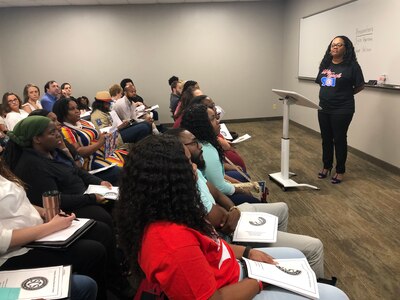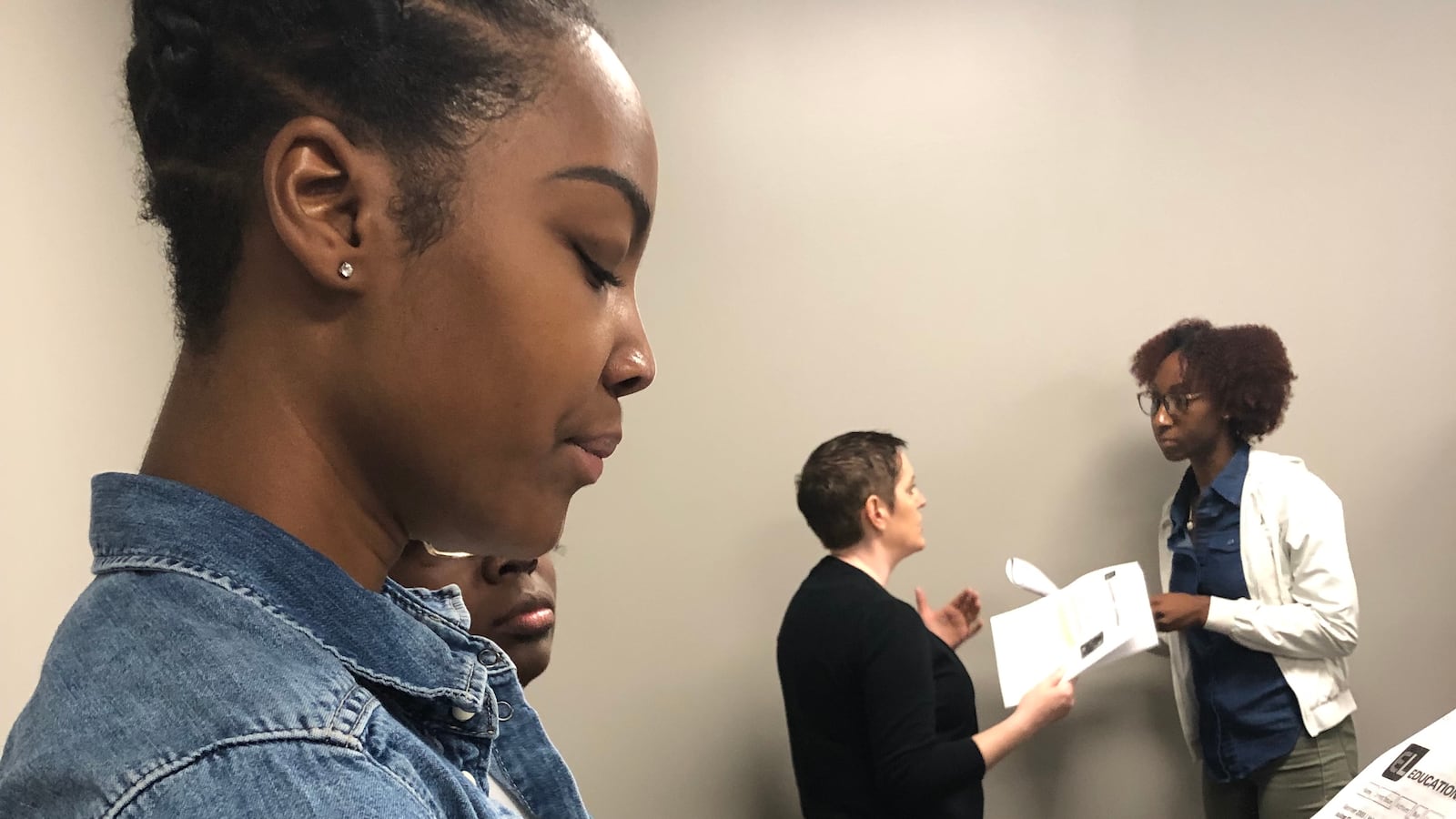Paige Williams made the 25-minute drive from her home in downtown Memphis to Bellevue Baptist Church in Cordova for her baptism — as a new Shelby County Schools teacher.
The sprawling megachurch hosted Williams, along with droves of other new teachers, for an optional two-day Shelby County Schools district orientation last week. Balloons and a puffy gold banner reading “Welcome Rising Stars,” greeted Williams as she signed in for the event at 7:45 a.m.
To mark the occasion of starting her first full-time teaching job, the 22-year-old decided to wear a white T-shirt with the phrase “Herstory in the making” printed in black lettering across the chest because “It reminds me that I can make a change, too.”
When school starts Monday, Williams will officially begin life as a sixth-grade English teacher at Craigmont Middle School in Memphis, though the excitement of the orientation made her feel like her career — her story — was already “coming together.”
As a recent graduate of the University of Mississippi, Williams fits the profile of a lot of teachers in the state: Nearly one in five were in their first or second year of teaching during the 2015-16 school year, according to data that schools reported to the federal government. That figure was even higher for Memphis schools.

High teacher turnover and limited classroom experience is not just a Tennessee problem — it’s a national problem that a wide body of research says undermines student performance.
Students of color and students from low-income families are affected the most. In schools with mostly students of color, almost half of teachers were inexperienced, compared with 8% of teachers in schools with few students of color, according to an analysis from the Learning Policy Institute.
Although new teachers may lack experience, many of them make up for it with an unsoured idealism.
“My main hope is to see students grow,” said Williams, who graduated from Central High School in Memphis and knew she wanted to return to the city to work. “I couldn’t see myself anywhere else.”
The school where she’ll be teaching is in chronic need of that kind of devotion because it’s part of the district’s Innovation zone, commonly known as the iZone. Launched in 2012, the iZone is a district-run turnaround effort for Memphis’ lowest performing schools and receives additional state money to attract top teachers and extend school hours. While it was at first showing gains compared with the state-run turnaround model, the Achievement School District, new findings show neither model has sustained success. Recruiting and retaining high quality teachers remains one of the most consistent challenges of both efforts.
But Williams, who last year worked as a teaching assistant at another iZone school isn’t worried. “I think there’s a lot of room for growth. I believe everybody can learn and these are great students …. I’m excited to see progress.”
She’s “open to all suggestions” on how best to achieve that, especially during her first year.

So, when she saw the ad for the orientation she reserved a spot, even though she’s already participating in a mandatory on-boarding process.
Last week’s orientation gave newly hired teachers like Williams the opportunity to learn more about the district’s heavy focus on social and emotional learning. Strategies include honing “habits of character, habits of practice, and habits of mind that can help them be successful in reaching their academic goals,” Marjon Bishop, the district’s professional learning and support manager who helped organize the event, said.
Williams spent the morning packed into the fellowship hall with 600 other new teachers, listening to a talk about student equity, meeting new teachers, and watching musical performances. She then followed a herd of other teachers up the stairs to Room 209 for an informational session on culturally responsive classroom management.
“With awareness of student needs, teachers can be a positive influence in students’ lives,” veteran teacher and district instructional advisor Joyce Harrison told the class.
The whole event’s spotlight on improving school culture fits with the Shelby County Schools board and superintendent Joris Ray’s priorities, which also include a focus on attendance, building improvements, and literacy.
At Craigmont, literacy scores remain low. In the 2017-18 school year, just 10% of students scored on grade level on the state’s reading test, compared with 20% of students in the district and a third statewide.
Williams, whose favorite book is “The Great Gatsby,” wants to change that. “When you talk to students they don’t always name language arts as their favorite subject because it’s a lot of reading,” she said. “I just want to help students enjoy reading.”

